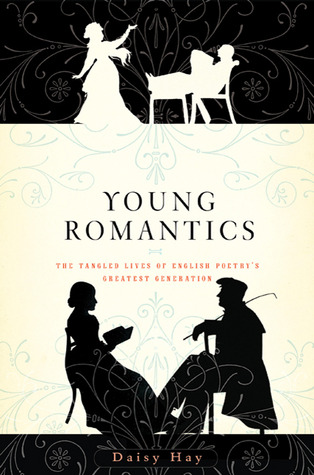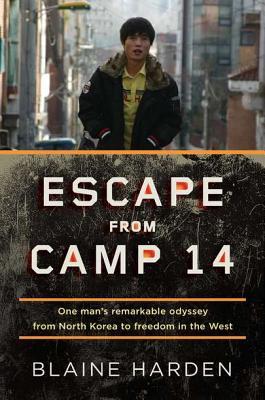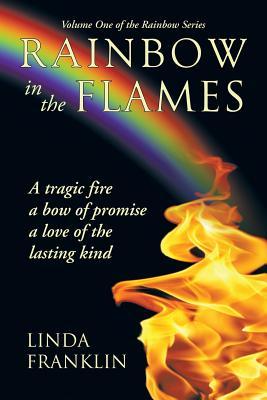Currently reading: The Sunne in Splendour by Sharon Kay Penman (thrilling $1 find at a thrift shop) and The Darwin Conspiracy by John Darnton (random selection at library). Listening to Heretic Queen: Elizabeth I and the Wars of Religion by Susan Ronald (seemed an appropriate selection for April, since last year at this time I immersed myself in Elizabeth's world).
Warning: Since I missed posting last month, this is a loooong post. Reviews of novels by authors I've read multiple books by lately are separate. I want to start writing more detailed reviews directly after finishing books, so subsequent Monthly Reading Roundups may contain links to longer reviews.
Young Romantics by Daisy Hay
Daisy
Hay's stated aim in this group-biography is to dispel the myth of the
second generation Romantic poets (especially Shelley, Byron, and Keats)
as a solitary geniuses, and to illuminate the "mingled yarn" of their
interactions and friendships. As such, it gives a comprehensive
biography of many figures, as well as amusing anecdotes of their
shared creativity. However, as the their lives and communities unravel
(with the tragic deaths of Keats and Shelley) the story is poignantly
sad. Not least because Hay is not writing hagiography: no one is wholly
sympathetic. In fact, in the words of Mary (Godwin) Shelley's step-sister
Claire Clairmont, Shelley and Byron's philosophy of free love
transformed them into "monsters of lying, meanness, cruelty and
treachery." Certainly I found Byron deplorable in his behavior to Claire
and their daughter Allegra. (Basically, I hate him.) Shelley frequently showed himself
unsympathetic to the anguish endured by Mary after the deaths of three
children. Much to my surprise I found myself liking Leigh Hunt best of
the assembled (male) caste, although Hay is honest about his financial
inabilities that gave rise to Dickens' caricature of him in the
character of Harold Skimpole. Keats drifted in and out of the group and
he was the notable poet I felt the book explored least.
Since I'm not particularly familiar with the second-generation Romantics, this group biography of them was a good introduction
Imprison Him by Miriam Wood
The
story of an Adventist pastor/missionary/administrator imprisoned for
six months by the totalitarian government of an unnamed (due to danger
for others) African country. I
still really want to know which country this is, as I'm sure it had
legitimate grievances with imperialism that it reacted to dangerously. A
good account of a wife's loyalty and the emotional and spiritual
struggles of the persecuted. It's been sitting on my grandma's bookshelf my whole life, so I'm thankful I finally read it, but it's definitely not among the most memorable reads of the year.
Mightier than the Sword: Uncle Tom's Cabin and the Battle for America by David S. Reynolds
Weird. I thought I'd written a short goodreads review of this, but now don't see one. However, I've written quite a lengthy post inspired by this book - so far my favorite non-fiction read of the year.
Escape from Camp 14 by Blaine Harden
I've read a shelf of books
with "escape" in the title. From stories of Jews under Nazism, to
Christians under Communism, to Huguenots under Catholicism, I've learned
about torture, hard-labor, and how the human spirit sustains courage
and compassion in the worst circumstances. Shin In Geun's story is
different: born into North Korea's worst internment camp, he never knew a
time when he was valuable. He viewed his mother as a competitor for
food, and felt no qualms of conscience when he reported that he had
heard her and his brother planning to escape. Watching them executed as a
result of his snitching, he felt only resentment against the parents
who had caused him to be born into this hideous prison. Years later, as
his conscience developed in the Western world, he developed remorse and
self-loathing for the "memory of the kind of son he once was." This, for
me, was probably the most tragic part of the book: the dehumanization
of the camp system and then the torture experienced when individuals
come to understand the guilt of the past.
North Korea is "viewed by human rights groups as the world's largest prison", and Camp 14 is
said to be among the worst of its many prison camps. It is a place where
Shin had his finger cut off for dropping a piece of machinery, a place
where a little girl may be beaten to death for stealing a few kernels of
corn. The book points out that even "free" North Korean escapees are
malnourished and under-sized for their age. It ultimately raises the
question of why powerful governments are willing to allow such human
rights atrocities to continue and also what we as individuals can do to increase awareness and concern.
Death of a Salesman by Arthur Miller
I tend to identify and empathize with failed, fatally flawed, characters, so of course was heart-broken by Willy Loman's doomed attempt to grasp and hold the American Dream. My one notable complaint about this play is that it failed the Bechdel Test.
Rainbow in the Flames: A Tragic Fire, A Bow of Promise, A Love of the Lasting Kind by Linda Franklin
Linda and eight-year-old Jed were alone at their remote mountain home when an explosion left him with third degree burns over more than half of his body. The story follows their painful journey of months spent in hospitals, years spent getting grafts, decades of regrets and questions. The most poignant and touching moments for me were reading of the despair and patience exhibited in one tiny little person. This book was also good for me because it taught me to see the humanity in people I disagree with. I know of the Franklins through their ministry (Sanctuary Ranch) and through mutual acquaintances. I've read one of Mr. Franklin's books, and disagree very strongly with his views on courtship, marriage roles, and women's dress and hair. However, this book showed me the pained, loving, and human hearts that lie behind the ideas and images of the people I am so quick to judge. Thus the book was both a rebuke and a beautiful inspiration.
Though the Heavens Fall by Mikhail P. Kulakov Sr.
Elder Kulakov became the leader of the Euro-Asian Division of Seventh-day Adventists and a translator of a Russian New Testament. But years before that he spent 5 years in a hard labor camp for his Christian faith and witnessing. Even after being released he experienced the constant surveillance that Stalin's regime exercised toward Christians. My mom and I read this together over a several months, so the story is already a little hazy in my memory. However, one vignette told Pastor Kulakov by a fellow prisoner stood out in my mind as similar to the world of 1984. It concerned a speech at a District Party Meeting that was loudly applauded, with a standing ovation, by all present. "For three minutes, four minutes, five minutes... it continued... Palms were getting sore and raised arms were already aching. The older people were panting from exhaustion." Yet all were afraid that stopping would brand them as enemies of the Party. Finally, "after eleven minutes, the director of the paper factory assumed a businesslike expression and sat down in his seat.... That same night [he] was arrested. They easily pasted 10 years on him on the pretext of something quite different. After he signed... the final document of the interrogation, his interrogator reminded him: 'Don't ever be the first to stop applauding!'" (p. 63-64)
Links to reviews of three Dorothy Sayers mysteries and three Philippa Gregory historical fiction novels.
(All images from goodreads.com)
 There is no frigate like a book
There is no frigate like a book





No comments:
Post a Comment